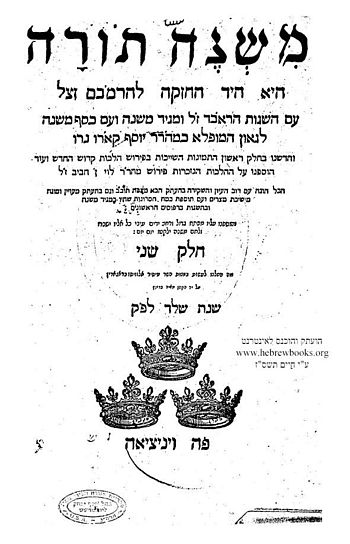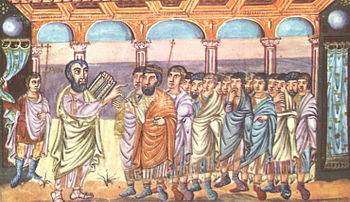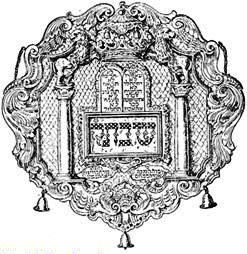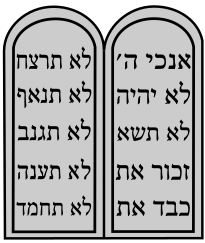In the people of God their year 2448 (1313 BCE), on the 6th (or 7th) day of the third month of the ecclesiastical year on the Hebrew calendar, Sivan, after Moshe was called up at the mountain of Sinai, God told his chosen one what to tell to the people. With the Shemoth or Exodus from Egypt only three months in the past, the Jews arrive at Mount Sinai to hear a terrible noise and to see flashing lights. They saw a mountain which was been touched and burned with fire and to blackness and to darkness and to tempest.
“Now all of the people were seeing the thunder-sounds, the flashing-torches, the shofar sound, and the mountain smoking; when the people saw, they faltered and stood far off.”
(Exodus 20:15 SB)“The people stood far off, and Moshe approached the fog where God was.”
(Exodus 20:18 SB)
Moshe having entered into the thick ‘darkness’ of the clouds, came to hear the Voice of God, the Most High Divine Creator. God spoke to Moshe
“… Say thus to the Children of Israel: You yourselves have seen that it was from the heavens that I spoke with you.”
(Exodus 20:19 SB)
There God gave to the Children of Israel what is by most Christians known as the “Ten commandments” but would be better referred to as the (literal translation) ““The Ten Sayings” or Decalogue. These Sayings including more than ten actual mitzvahs. Later Jeshua would tell that he has come not to take that Law away, like so many christians think, but to explain it and to fulfil it.
“Do not suppose that I came to tear-down the law or the prophets; I did not come to tear-down, but to fulfil.”
(Matthew 5:17 MLV)“But it is easier for heaven and earth to pass away, than for one serif of the law to fall short.”
(Luke 16:17 MLV)“Now I am saying this: the law, which happened four hundred and thirty years afterward, does not invalidate a covenant* validated beforehand by God in reference to Christ so as to do-away-with the promise.”
(Galatians 3:17 MLV)
Many thousand years ago God found it time that what He wanted people would know very well what He expected from them. He wanted to make it clear to them what His expectations were.
He made it clear what He wanted man to keep to.
For those who doubt it, or use graven images in their worship places God made it clear He does not like such things.
“You are not to make beside me gods of silver, gods of gold you are not to make for yourselves!”
(Exodus 20:20 SB)
No body, who wants to be a child of God, may have more than One God before him or may become unequally yoked with unbelievers and take part in pagan rites and pagan festivals (like Halloween, Christmas, Easter, just to call a few).
It was on Sivan 2 that the Almighty God tells Moshe that He not only wants to give the Jews the Torah, but also wants to make them His chosen, set apart or holy nation, who will follow His commandments. The Jews wholeheartedly agree, replying,
“All God wishes we will do.”
On the third day of the month Moses relays the Jews’ answer to God and then returns to the Jews to tell them that he will be the messenger for the Ten Sayings; that what God told him up high on the mountain.
This weekend, Adar 6, 5777, we remember the giving of Torah and this transitional moment in our history — a moment known as Matan Torah (the Giving of the Torah). No longer were we merely the descendants of a great man named Abraham, or simply a Middle-Eastern people known as the Israelites. We had now become God’s people, chosen to learn His Torah and keep its laws. It’s a moment we celebrate every year on the festival of Shavuot, and this year will take place from May 30–June 1.
The Torah and Talmudic sources describe the delivery of the Ten Commandments as a unique experience — complete with thunder, lightning and a smoking mountaintop — and an event of historic significance. Yet the Talmudic account itself actually makes it quite difficult to understand what was so earth-shattering about
“the giving of the Torah.”
It was not that people did not yet know God’s Will. A significant body of legislation and moral lore was already in existence long before the historic event described as “the giving of the Torah.” Indeed, even without the Talmudic tradition it would seem that all of the Ten Commandments given at Sinai are either philosophical axioms (e.g., monotheism), moral imperatives and ideals (e.g., do not murder, do not steal, honour your father and mother, do not covet), or previously received mandates (e.g., the Sabbath). In other words, not the sort of material that would seem to warrant a divine revelation — and certainly not one of such grandeur.
But we should know that it was no simple handing over a book of lore … God gave man the basic rules to live by, the Ten Commandments.
Please do understand, though the name of the event — the Giving of the Torah — implies that the entire Torah was given that day, this is not the case. In fact, only the Ten Commandments were taught to us that day, and even they were only transmitted verbally. The physical luchot—the tablets — were not given for another 40 days.
Nevertheless, the name remains, as it marks the day the Elohim began the process of giving us the Torah. In that light we should remember this weekend which great gift we were given so that it would be much easier for us to know how to keep in line with God’s desires.
First we were taught the Ten Commandments. Then, Moses stayed on Mount Sinai to learn from God, for 40 days. We too can take such 40 days to meditate and wonder about our relationship with the Most High. You can call it a time of reflection. Also Jeshua took such a time to think about what God wanted from him and his followers. He too had gone in the desert for 40 days to contemplate. Jeshua also took time to cogitate and was not afraid to deny the requests from others to denounce God or to test God. Also God’s people had to wait such a long time before they saw Moshe back. Though they proved not to be as strong as Moshe and Jeshua, Jesus Christ, who thought it most important to do the Will of God and not his own will. Though it is clearly impossible for Moshe to have learned ‘all 385 commandments’, he did learn the rules they are based on, and so it is considered as if he actually learned them. On stone tablets the basic 10 sayings cover most rules. The rest of the Torah was communicated in stages throughout the Jews’ 40-year sojourn in the desert.
In short we could say
The Ten Commandments
- Believe in Only One God.
- Do not believe in other deities.
- Do not take God’s name in vain.
- Keep Shabbat.
- Honour your parents.
- Don’t murder.
- Don’t commit adultery.
- Don’t kidnap.
- Don’t give false testimony.
- Don’t covet another’s possessions.
This our the basic rules for man to follow. The 4 first ones you could consider laws believers in God should follow, but the 5th until the 10th commandment form the basic rules for all people, who should take care to be able to live with each other in the best and most peaceful conditions. By obeying those given ethic laws for humanity man should be able to live in peace.
Although Matan Torah is known as the time when God gave us His Torah to study and keep, there were a few Israelites who had kept the entire Torah of their own volition before Matan Torah.
Now the moment had come that the Elohim Hashem Jehovah asked man to take the act of making a conscious choice or decision. It had become time man had to show for Whom he wanted to stand. From the beginning of times God had given man freedom to act or judge on one’s own. Now it is time for man to show that he has the ability or power to discern what is responsible or socially appropriate.
Man has to make the choice how he is going to behave in a community. He has to choose the position he is going to take opposite others and how he is going to treat them.
Before Matan Torah, those who observed Torah did so entirely of their own accord. It was their own choice and we can not tell in what way they wanted to do it. We can only guess how they saw it as a matter of having a good relationship with the Divine Creator.
Probably their connection to God, therefore, was only as deep as their understanding and feeling. Like today people who come into the faith cannot know yet all what they have to keep to and have to go on a path of learning to come to know what God really wants from them.

The Title page of Mishnah Torah by Moshe ben Maimon haRambam, published in Venice in 1575 (Photo credit: Wikipedia)
For us tonight having Matan Torah in our mind, we look at the time the Elohim connected His Essence to the Torah and gave it to mankind and as such also to us. Each of us has the own responsibility now to decide to accept that given Torah or to deny it. Each of us should see how The Law of God is our safeguarding but also our inner set apart (holy) contact with the Most High. When we observe the Torah, therefore, we are connected to God’s essence, no matter who we are and how much we understand or feel. {Likutei Sichot, vol. 28, pp. 11-12.}
Fear may have seized those at the fields before the mountain of Sinai, but we should not be in fear, because “God has visited his people!” and given His instructions so that they could live according to the Wishes of God. We should know that in every place where God’s Name is recorded He will come to us and will bless us.
“Moshe said to the people: Do not be afraid! For it is to test you that God has come, to have awe of him be upon you, so that you do not sin.”
(Exodus 20:17 SB)“A slaughter-site of soil, you are to make for me, you are to slaughter upon it your offerings-up, your sacrifices of shalom, your sheep and your oxen! At every place where I cause my name to be recalled I will come to you and bless you.”
(Exodus 20:21 SB)“I will make a great nation of you and will give-you-blessing and will make your name great. Be a blessing!”
(Genesis 12:2 SB)“So are they to put my name upon the Children of Israel, that I myself may bless them.”
(Numbers 6:27 SB)
Moshe wrote down the Words of God and that way even today we can read what God wants from His creatures.
“Now Moshe wrote down all the words of YHWH. He started-early in the morning, building a slaughter-site beneath the mountain and twelve standing-stones for the twelve tribes of Israel.”
(Exodus 24:4 SB)

Moses repeated the commandments to the people, detail by a Carolingian book illuminator circa 840 (Photo credit: Wikipedia)
+
Preceding articles
God’s wisdom for the believer brings peace
Mishmash of a legal code but importance of mitzvah or commandments
Written by inspiration of God for our admonition, to whom it shall be imputed if they believe
Whoopi Goldberg commandments and abortion
Responsibilities of Parenthood for sharing the Word of God
++
Additional reading
- Statutes given unto us
- A god who gave his people commandments and laws he knew they never could keep to it
- Necessary to be known all over the earth
- God-breathed prophetic words written torah and the mitzvot to teach us
- Observing the commandments and becoming doers of the Word
- Displeasures and Actions of the Almighty GodJudeo-Christian values and liberty
- Not trying to make the heathen live like Jews #1
- Hello America and atheists
- 1,500 to 1,700 years old Chiselled tablet with commandments sold at auction
+++
Further reading
- Our Competition With God
- A Summary of Exodus
- February 6, 2017-The Beginning of Law’
- Intro to the Ten Commandments or The Ten Words
- Ten Commandments – Exodus 20:1-17
- Exodus 24:12-18 Moses was on the mountain for 40 days and 40 nights
- The first commandment – Putting God first
- God verses our gods
- God’s nature revealed as Law
- The 10 Commandments
- The Ten Commandments
- The Ten Commandments and Prophesy
- Daily Prompt: Ten
- Do You Keep the Ten Commandments
- 10 Rules Worth Following
- Ten Commandments
- Do the Ten Commandments apply to Christians?
- The beginning
- Can the Old Covenant be abolished if the Ten Commandments are not?
- “The Catechism in Six Parts: The Ten Commandments”
- How Not to Learn from The Bible
- God the Father – “I did not create you so that you could do whatever you want…”
- Want What You’ve Got! (Lent)
- Christian Parenting, Ten Commandments, and Les Miserables
- It Depends
- Idolatry & The Shack
- Honor Your Parents
- What I’m Reading: Are You Normal?
- Simple Standard
- Rules of the Road
- Sabbath, Creation, Guarding and Observing
- Top Ten Secrets From The Foundation Of Our World
- Simply following the Ten Commandments isn’t enough
- Seven Fundamental Practices: Sabbath Rest
- Sermon: Who Do You Love?
- Love and the Meaninglessness of Scripture
- Lust of the eyes
- Morality and neurochemical impulses
- Shorty*: What Ultimately Comforted Job?
- Jesus Christ – “Remember, you are not here to please man with your actions but God – God’s Laws never change”
- I’ll Do It My Way -the terrible harvest of moral relativism
+++


































































Pingback: A particularly difficult document to understand – Some View on the World
Pingback: Not always so easy to keep to the sabbath – Jeshuaisten / Jeshuaists
Pingback: rules? | From guestwriters
Pingback: A curious girl – Worldviewer